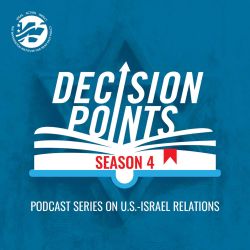Share

Decision Points
The United States, Israel, and the Iranian Challenge
This episode focuses on the growing threat of a nuclear Iran and U.S.-Israeli efforts to contain it over the years. The two allies have long considered various diplomatic and military options for addressing their shared concerns, though there have been points of disagreement, particularly over the “sunset” limitations put forth in the 2015 nuclear deal. Given the recent assassination of Qods Force commander Qasem Soleimani, recalling the intersections and divergences between their Iran policies has become more valuable than ever.
Howard Berman and David Petraeus join host David Makovsky to discuss these issues and Tehran’s broader role in the U.S.-Israel relationship. Rep. Berman (D-CA) served in the House of Representatives from 1983 to 2013, chairing the Foreign Affairs Committee and becoming a top foreign policy figure, particularly on Iranian matters. Gen. David Petraeus has a long, distinguished career of public service as well, culminating in his appointment as CIA director in 2011. Previously, he served thirty-seven years in the U.S. Army, including as head of CENTCOM.
Audio Clips Used
The President Announces a Historic Nuclear Deal with Iran
Complete Prime Minister Benjamin Netanyahu Address to Joint Meeting of Congress (C-SPAN)
More episodes
View all episodes

11. The Judiciary Debate and the Future of Israeli Democracy
01:10:33Host David Makovsky is joined by Prof. Yedidia Stern, president of the Jewish People Policy Institute and former dean of the law faculty at Bar-Ilan University, and Justice Elyakim Rubinstein, Israel’s former attorney-general and the recently retired deputy president of its Supreme Court. After breaking down the history and structure of Israel’s judiciary, they discuss the serious implications that Justice Minister Yariv Levin’s radical reform package could have for the future of Israeli democracy.
10. Grappling with the Direction of the New Netanyahu Government
01:04:42In the season finale, David is joined by Ben Caspit, columnist and author of The Netanyahu Years, and David Horovitz, the founding editor of The Times of Israel, to discuss Israel's returning prime minister and his controversial right-wing government. David and the guests break down the keys to Binyamin Netanyahu's long-lasting political career, the evolution of his public persona, and try to understand the trajectory of the new government.
9. Combating Anti-Semitism in the Middle East and Beyond
39:48David is joined by acclaimed historian Deborah Lipstadt, appointed by President Biden as the State Department's Special Envoy for Monitoring and Combating Anti-Semitism. The two discuss the state of contemporary anti-Semitism, reflect upon the role of the Holocaust in Israel, and draw takeaways from Lipstadt's travels to the Gulf and Morocco.
8. Rabbi Kook: Founding Religious Zionism and Those Who Seek to Subvert His Legacy Today
54:49In this episode, host David Makovsky welcomes Yehudah Mirsky, professor of Near Eastern and Judaic studies at Brandeis University, faculty member of the Schusterman Center for Israel Studies, and author of Rav Kook: Mystic in a Time of Revolution. The two discuss the ideology of Rabbi Abraham Isaac Kook, founder of Religious Zionism, and how his teachings are being subverted by certain members of the modern movement.
7. Too Much History and Too Little Geography: A Conversation Across the Israeli-Palestinian Societal Divide
48:53Yossi Klein Halevi, Shalom Hartman Institute fellow and author of Letters to My Palestinian Neighbor, joins the podcast to discuss Israeli-Palestinian coexistence with Yousef Bashir, Director of Research & Operations for the S. Daniel Abraham Center for Middle East Peace and author of The Words of My Father. Halevi and Bashir share personal experiences, common public perceptions among Israelis and Palestinians, and potential steps to narrow the societal divide amid difficult times.
6. An Insider's View of the Carter White House: Negotiations with Sadat, Begin, and Assad
56:33David Makovsky hosts veteran diplomat Stuart Eizenstat, who served as Jimmy Carter’s chief domestic policy advisor and whose book President Carter: The White House Years provides an unparalleled view of the administration’s Middle East decisionmaking. In this episode, David and Stuart discuss the Camp David Accords, U.S.-led negotiations with Syria’s Hafiz al-Assad, an Egyptian-Israeli field trip to Gettysburg, and more.
5. Kissinger’s Middle East: Limiting Moscow and Starting a Road to Peace
47:12David Makovsky hosts Martin Indyk, Washington’s former peace envoy and ambassador to Israel, to discuss his recent book Master of the Game: Henry Kissinger and the Art of Middle East Diplomacy. The conversation will focus on Kissinger’s Middle East strategy from the 1973 war to the beginnings of the peace process.
4. Jabotinsky and the Birth of the Israeli Right
49:07Hillel Halkin, author of Jabotinsky: A Life, joins host David Makovsky to discuss Russian Zionist thinker Zeev Jabotinsky and the origins of the Revisionist movement, which has shaped a great deal of Israel’s political thought over the decades.
3. David Ben-Gurion: Leader of the Young State Confronts Momentous Decisions
56:59David Ben-Gurion's term as Israel's prime minister marked not only a new era for the Jewish people, but a starkly different chapter in his own life. Anita Shapira, the author of Ben-Gurion: Father of Modern Israel, joins the podcast to discuss the challenges and accomplishments of this time, from immigration and Labor party politics to German reparations and nuclearization.